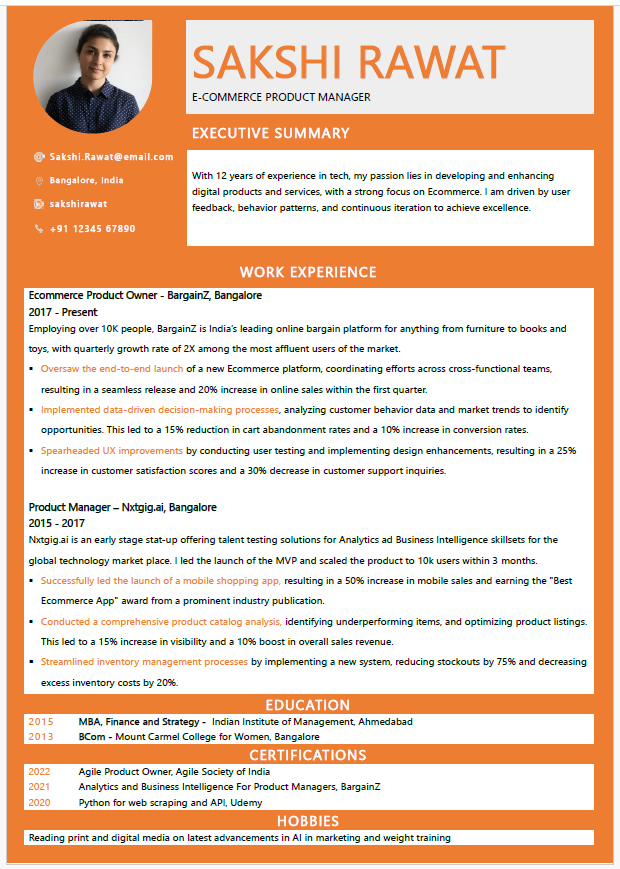Ecommerce Product Manager
MBA, Finance and Strategy

About this template
This is a very colorful and modern resume which can help you stand out from the competition.
This resume is made by MS Word, featuring a clean and modern layout designed to highlight your skills and achievements.
Some most common and important interview questions for Ecommerce Product Manager
Here are some of the most common and important interview questions for an E-commerce Product Manager, along with brief answers that highlight key skills:
1. How do you prioritize features for a product roadmap?
Prioritizing features involves balancing customer needs, business goals, and technical feasibility. I use frameworks like MoSCoW or RICE to evaluate feature impact and urgency, ensuring that the most valuable features are prioritized for development.
2. What is your approach to understanding customer needs in e-commerce?
Understanding customer needs is crucial in e-commerce. I gather insights through user research, customer feedback, and analytics. My ability to translate these insights into actionable product features helps in enhancing user experience and driving sales.
3. Can you discuss your experience with A/B testing?
A/B testing is vital for optimizing product features. I design and run experiments to test different versions of features or interfaces, analyzing results to determine which version performs better. This data-driven approach ensures that product decisions are based on real user behavior.
4. How do you collaborate with cross-functional teams?
Collaboration is key in product management. I work closely with engineering, design, marketing, and sales teams, ensuring clear communication and alignment on product goals. My ability to bridge the gap between different departments helps in delivering a cohesive product.
5. What metrics do you track to measure product success?
Tracking the right metrics is essential for evaluating product success. I focus on key performance indicators (KPIs) like conversion rate, customer acquisition cost (CAC), lifetime value (LTV), and cart abandonment rate to measure the impact of product changes on business outcomes.
6. How do you handle competing stakeholder demands?
Managing stakeholder expectations requires balancing different priorities. I ensure transparent communication, set clear expectations, and use data to justify decisions. My ability to navigate these dynamics helps in maintaining alignment and focus on the product vision.
7. Describe your experience with product lifecycle management.
Product lifecycle management involves overseeing a product from concept to sunset. I manage each phase—launch, growth, maturity, and decline—by adapting strategies to market conditions and customer needs, ensuring the product remains competitive and profitable.
8. How do you approach competitive analysis in the e-commerce space?
Competitive analysis is crucial for staying ahead in e-commerce. I regularly monitor competitors, analyze their strengths and weaknesses, and identify opportunities to differentiate our product. This strategic insight helps in positioning our product effectively in the market.
9. Can you discuss a time when you had to pivot a product strategy?
Pivoting product strategy requires agility and responsiveness to market changes. In a previous role, I had to shift focus from a planned feature set to enhancing mobile usability based on user feedback. My ability to adapt quickly ensured that we met customer expectations and increased engagement.
10. What is your experience with e-commerce platforms and technologies?
Familiarity with e-commerce platforms like Shopify, Magento, or WooCommerce is essential. I have experience integrating these platforms with various payment gateways, CRM systems, and analytics tools, ensuring a seamless and efficient customer experience.
Conclusion:
These questions and skills are crucial for evaluating an E-commerce Product Manager's ability to manage the complexities of product development, customer needs, and market dynamics, ensuring the successful delivery of e-commerce products that drive business growth.